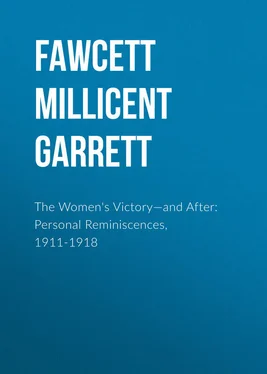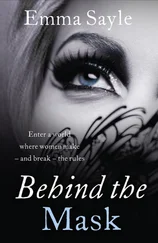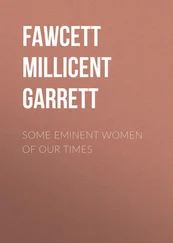Millicent Fawcett - The Women's Victory—and After - Personal Reminiscences, 1911-1918
Здесь есть возможность читать онлайн «Millicent Fawcett - The Women's Victory—and After - Personal Reminiscences, 1911-1918» — ознакомительный отрывок электронной книги совершенно бесплатно, а после прочтения отрывка купить полную версию. В некоторых случаях можно слушать аудио, скачать через торрент в формате fb2 и присутствует краткое содержание. Издательство: Иностранный паблик, Жанр: foreign_antique, foreign_prose, на английском языке. Описание произведения, (предисловие) а так же отзывы посетителей доступны на портале библиотеки ЛибКат.
- Название:The Women's Victory—and After: Personal Reminiscences, 1911-1918
- Автор:
- Издательство:Иностранный паблик
- Жанр:
- Год:неизвестен
- ISBN:нет данных
- Рейтинг книги:4 / 5. Голосов: 1
-
Избранное:Добавить в избранное
- Отзывы:
-
Ваша оценка:
- 80
- 1
- 2
- 3
- 4
- 5
The Women's Victory—and After: Personal Reminiscences, 1911-1918: краткое содержание, описание и аннотация
Предлагаем к чтению аннотацию, описание, краткое содержание или предисловие (зависит от того, что написал сам автор книги «The Women's Victory—and After: Personal Reminiscences, 1911-1918»). Если вы не нашли необходимую информацию о книге — напишите в комментариях, мы постараемся отыскать её.
The Women's Victory—and After: Personal Reminiscences, 1911-1918 — читать онлайн ознакомительный отрывок
Ниже представлен текст книги, разбитый по страницам. Система сохранения места последней прочитанной страницы, позволяет с удобством читать онлайн бесплатно книгу «The Women's Victory—and After: Personal Reminiscences, 1911-1918», без необходимости каждый раз заново искать на чём Вы остановились. Поставьте закладку, и сможете в любой момент перейти на страницу, на которой закончили чтение.
Интервал:
Закладка:
Millicent Garrett Fawcett
The Women's Victory—and After: Personal Reminiscences, 1911-1918
"When there is a fervent aspiration after better things, springing from a strong feeling of human brotherhood and a firm belief in the goodness and righteousness of God, such aspiration carries with it an invincible confidence that somehow, somewhere, somewhen, it must receive its complete fulfilment; for it is prompted by the Spirit which fills and orders the Universe throughout its whole development."
J. B. Mayor: Virgil's Messianic Eclogue .CHAPTER I
THE TWO DEPUTATIONS
"I have a passionate love for common justice and common sense."
– Sydney Smith.In 1911 I wrote a little book called "Women's Suffrage: a Short History of a Great Movement." My intention in the following pages is to bring my story up to February 6th, 1918, when the Royal Assent was given to the Representation of the People Act, which for the first time placed women on the register of parliamentary voters.
In 1911 I ended my book on a note of confidence. I felt quite sure that we were going to win soon, but I did not the least foresee the wonderful series of events which actually led to so complete and great a victory.
Not that all the signs were favourable in 1911 – very far from it. There were many ominous clouds on the horizon, and one of the chief of them was the known hostility of Mr. Asquith, then Prime Minister, and at the zenith of his power. His acuteness and dexterity in offence and defence were unrivalled, and most suffragists believed that he intended to wreck our cause on the rocks of Adult Suffrage, for which there had been no demand in the country.
In 1908, almost immediately after he became Prime Minister, Mr. Asquith had announced his intention before the expiration of that Parliament to bring in an Electoral Reform Bill; this Bill, he had declared, would not include women; but he pledged his Government not officially to oppose a woman suffrage amendment "if drafted on democratic lines." The Parliament elected in 1906 with an overwhelming Liberal majority was dissolved in 1909 without the fulfilment of this intention. There were two General Elections in 1910 without the introduction of a Reform Bill. But the suffrage societies continued without intermission to keep up a tremendously active agitation for the enfranchisement of women. The various methods employed have been sufficiently described in my earlier book. It is enough here to state that a large majority of Members of the House of Commons, belonging to all parties, were pledged to support women's suffrage; that various private Members' Bills for extending the franchise to women had passed their second reading in the Commons every year since Mr. Asquith became Prime Minister; that the strength of our support in the rank and file of the Liberal – and also in the Conservative – Party was constantly growing, and that the Labour Party had definitely placed the enfranchisement of women upon its official programme. In January, 1913, immediately after what will be hereafter described as the Franchise Bill fiasco of Mr. Asquith's Government, the Labour Party, at its annual conference, passed by an enormous majority a resolution reaffirming its support of women's suffrage, and calling "upon the party in Parliament to oppose any Franchise Bill in which women are not included." This was the most signal service to our cause which had then been rendered by any political party.
It was followed at the next meeting of the Trades Union Congress by the adoption of the following resolution:
"That this meeting expresses its deep dissatisfaction with the Government's treatment of the franchise question … and protests against the Prime Minister's failure to redeem his repeated pledges to women, and calls upon the Parliamentary Committee to press for the immediate enactment of a Government Reform Bill, which must include the enfranchisement of women."
Over forty trade unions, including the most important, such as the N.U.R. and the A.S.E., adopted resolutions supporting the enfranchisement of women.
The formation of the Conciliation Committee in the House of Commons in 1910 has been sufficiently described in my earlier book (p. 73). Its object was to unite all suffragists in the House, and secure their support for a suffrage Bill which was believed to represent their greatest common measure. They decided that this would be found in a Bill to enfranchise women householders – those women, in fact, who had for about forty years been admitted to the local franchises. The Bill was called the Conciliation Bill because it had reconciled differences existing between various types of suffragists inside the House of Commons.
In July, 1910, two days of the Government's time had been given for a full-dress debate upon the Conciliation Bill. Hostile speeches from Mr. Asquith and Mr. Austen Chamberlain, on the ground of their complete opposition to all kinds of women's suffrage, were followed by equally vehement and hostile speeches from Mr. Lloyd George and Mr. Winston Churchill, on the ground that this particular Bill did not go far enough, and was so drafted as not to admit of amendment. In anticipation of, and during, the Parliamentary debate, The Times came out with a hostile article every day for nearly a fortnight, and its columns contained numerous letters prophesying all kinds of horrors and disasters which were to be expected if women were allowed to vote; many were of the type satirized in "Rejected Addresses," "What fills the Butchers' Shops with Large Blue Flies?" Notwithstanding all this, the division on the Second Reading resulted in a majority of 110 for the Bill, a far larger figure than the Government had been able to command for any of its party measures.
On November 12th, in anticipation of the second General Election in 1910, Mr. Asquith gave a pledge in the House of Commons that his Government would, if still in power, give facilities in the next Parliament for " proceeding effectively " with a Bill to enfranchise women if so framed as to permit of free amendment. The second General Election of 1910 took place immediately after this, in December, and again resulted in a majority for Mr. Asquith and the Liberal Party.
On the reassembling of the new House the Conciliation Bill Committee was reformed, Lord Lytton and Mr. Brailsford again acting respectively as chairman and hon. secretary. The Bill was redrafted on the same lines as regards its provisions, but in a form which admitted of free amendment. Our friends were lucky in the ballot, and the debate and division taking place on May 5th, 1911, it was found that the majority of 110 in 1910 had grown to a majority of 167 in 1911 – only 88 Members voting against it.
Militantism, or, as it would now be called, "direct action," had been suspended from the beginning of 1911 in view of Mr. Asquith's promise to grant time for "proceeding effectively" with all the stages of a Suffrage Bill during that Session. It should be noted that these two suffrage victories in the House of Commons in July, 1910, and May, 1911, had taken place, in each case, when Members were fresh from contact with their constituencies after the General Elections of January and December, 1910. The contrary was often most ignorantly, if not maliciously, asserted by antisuffragists. After the big majority for the Conciliation Bill in May, 1911, Mr. Lloyd George promised that in the next Session a week of Government time should be given for the Second Reading and further stages of the Bill, assuming, of course, its having received a Second Reading. Sir Edward Grey further explained the value of this offer, and said (June 1st, 1911) that a definite opportunity had been promised to the House of Commons, and that it was important that people should understand that it was a "real opportunity," and "not a bogus offer." In a letter to Lord Lytton, dated June 15th, Mr. Asquith endorsed what Sir Edward Grey (now Viscount Grey of Fallodon) had said; and writing again on August 23rd, he made it clear that his promise applied to the Conciliation Bill, and not to any other women's suffrage measure. Therefore it was not astonishing that suffragists of all shades of opinion had high hopes of a real victory in the Session of 1912.
Читать дальшеИнтервал:
Закладка:
Похожие книги на «The Women's Victory—and After: Personal Reminiscences, 1911-1918»
Представляем Вашему вниманию похожие книги на «The Women's Victory—and After: Personal Reminiscences, 1911-1918» списком для выбора. Мы отобрали схожую по названию и смыслу литературу в надежде предоставить читателям больше вариантов отыскать новые, интересные, ещё непрочитанные произведения.
Обсуждение, отзывы о книге «The Women's Victory—and After: Personal Reminiscences, 1911-1918» и просто собственные мнения читателей. Оставьте ваши комментарии, напишите, что Вы думаете о произведении, его смысле или главных героях. Укажите что конкретно понравилось, а что нет, и почему Вы так считаете.












